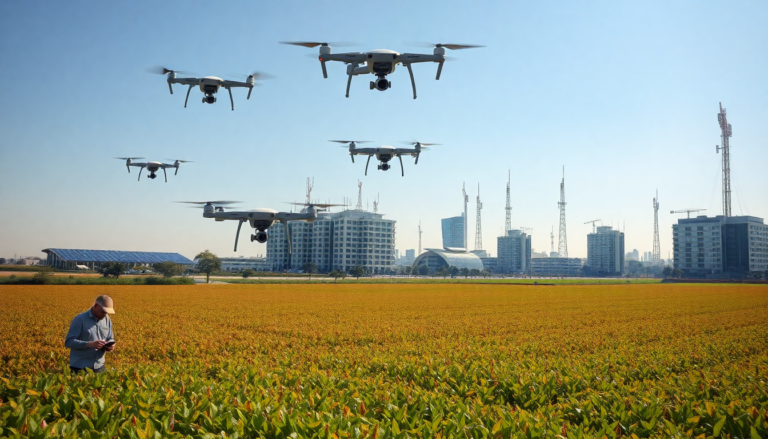Argomenti trattati
The world of technology is evolving at an unprecedented pace, with various sectors experiencing significant transformations driven by advancements in AI, drones, and telecommunications. Understanding these shifts is essential for anyone interested in the future of defense, agriculture, and real estate, among other fields. This exploration delves into the burgeoning markets of maritime surveillance, smart agriculture, and advanced automotive solutions, highlighting the pivotal role that technology plays in shaping these industries.
Maritime surveillance market trends
The maritime surveillance market is witnessing a surge in demand for AI-driven solutions that enhance security and operational efficiency. With the increasing need to monitor vast ocean expanses, technologies such as satellite communications and drone surveillance have become indispensable. AI algorithms are now being deployed to analyze data collected from these sources, enabling real-time decision-making that can thwart illegal activities and ensure maritime safety.
Moreover, the integration of 5G technology into maritime operations has revolutionized communication capabilities, allowing for faster data exchange and improved connectivity between vessels and command centers. This synergy between AI and telecommunications not only enhances surveillance capabilities but also streamlines logistics and supply chain management within the maritime sector.
AI in defense and security sectors
Artificial intelligence has emerged as a game-changer in the defense and security markets. The application of AI technologies enables military and law enforcement agencies to process vast amounts of data, identify patterns, and predict potential threats with unprecedented accuracy. From advanced missile defense systems to counter-drone strategies, the adoption of AI is reshaping how security forces operate.
As nations invest heavily in developing AI capabilities, the competitive landscape is evolving. Countries are not only focusing on creating advanced defense technologies but are also exploring ethical implications and regulatory frameworks to govern their use. This dual approach of innovation and regulation is crucial for maintaining global stability while harnessing the benefits of advanced technologies.
AI in agriculture: A new frontier
The agricultural sector is undergoing a transformation propelled by AI and IoT technologies. Farmers are increasingly adopting precision agriculture techniques, utilizing tools such as soil testing robots and crop monitoring systems to optimize yields and reduce waste. The rise of e-commerce for agricultural products is also changing the way farmers market their goods, allowing for better pricing and access to a larger customer base.
In Japan, for instance, the smart agriculture market is booming, with innovative farm management software helping farmers make data-driven decisions. This shift not only enhances productivity but also promotes sustainability by minimizing the environmental impact of farming practices. The future of agriculture lies in the successful integration of technology, paving the way for more resilient food systems.
Automotive technology trends
As we venture deeper into the automotive market, the influence of technology becomes increasingly apparent. Ride-sharing applications and e-scooter rental services are reshaping urban mobility, offering convenient alternatives to traditional transportation methods. AI is playing a crucial role in enhancing these services, optimizing routes, and improving safety features for users.
The automotive blockchain market is also gaining traction, providing secure and transparent transactions that enhance trust among stakeholders. This technology is particularly relevant in vehicle insurance and micro-mobility solutions, where efficiency and reliability are paramount. As the industry embraces these innovations, consumers can expect more seamless experiences and improved service offerings.
Wearable technology and personal safety devices
The wearable technology market is expanding rapidly, with smart personal safety devices leading the charge. These gadgets are designed to enhance individual security, offering features such as real-time location tracking and emergency alerts. As concerns regarding personal safety continue to rise, the demand for such technologies is likely to increase.
Furthermore, the integration of AI in wearable devices is enhancing their functionality. From fitness tracking to health monitoring, these technologies are becoming indispensable tools for maintaining well-being. The evolution of wearables is not just about convenience; it’s about empowering users to take control of their safety and health in an increasingly unpredictable world.
Future perspectives in technology markets
Looking ahead, the intersection of technology and various sectors will continue to evolve. As advancements in AI, drone technology, and telecommunications progress, we can expect to see new market opportunities and challenges emerge. The balance between innovation and ethical considerations will be crucial as stakeholders navigate this complex landscape.
Ultimately, the ongoing integration of technology across different markets will not only drive economic growth but also revolutionize the way we live and interact with our environment. The future promises exciting developments, and staying informed is key to understanding the implications of these changes.

